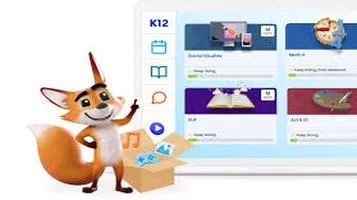A Comprehensive Review of K12 Homeschool Curriculum Programs
K12 Homeschool Curriculum Programs offer a comprehensive and flexible educational solution designed for families seeking a personalized learning experience at home. These programs provide a wide range of subjects, including math, science, language arts, and social studies, tailored to different grade levels from kindergarten through 12th grade. K12's curriculum is developed by experienced educators and utilizes engaging multimedia resources, interactive lessons, and hands-on activities to cater to diverse learning styles. With an emphasis on critical thinking and problem-solving skills, K12 aims to foster a deep understanding of core concepts. Parents receive support through detailed lesson plans, progress tracking tools, and access to certified teachers, ensuring that students receive a well-rounded education while learning at their own pace.

In recent years, the educational landscape has undergone significant transformation, with many parents seeking alternative methods to traditional brick-and-mortar schools. Among the various options available, K12 Homeschool Curriculum Programs have emerged as a prominent choice, offering a blend of flexibility, rigor, and personalized learning. This review delves into the key features, advantages, and potential drawbacks of K12 Homeschool Curriculum Programs to provide a balanced perspective for prospective users.
Curriculum and Academic Rigor
K12 Homeschool Curriculum Programs are renowned for their comprehensive and rigorous academic content. The curriculum is designed to meet or exceed state and national standards, ensuring that students receive a quality education comparable to traditional schools. The program offers a wide range of subjects, including core areas such as Mathematics, English Language Arts, Science, and Social Studies, as well as electives like Music, Art, and World Languages. This breadth of subjects provides students with a well-rounded education and the opportunity to explore their interests.
One of the standout features of K12 is its adaptive learning technology. This technology tailors lessons to the individual needs of each student, thus enhancing the learning experience. By assessing a student's strengths and weaknesses, the program adjusts the level of difficulty and pace, ensuring that students remain challenged yet not overwhelmed. This personalized approach is particularly beneficial for students who may struggle in certain areas or excel in others, allowing them to progress at their own pace.
Flexibility and Convenience
Flexibility is a significant advantage of K12 Homeschool Curriculum Programs. Unlike traditional schools with fixed schedules, K12 allows students and parents to create a customized learning plan that fits their lifestyle. This flexibility is especially valuable for families with unique circumstances, such as those who travel frequently, have unconventional work hours, or need to accommodate special needs.
Parents play a crucial role in the K12 homeschooling experience, acting as Learning Coaches. This involvement can foster a closer parent-child relationship and enable parents to have a direct influence on their child's education. Additionally, the program provides extensive resources and support for parents, including training sessions, instructional guides, and access to a community of fellow Learning Coaches. This support network can be invaluable for parents who may feel overwhelmed by the responsibility of homeschooling.
Interactive and Engaging Learning Experience
K12's curriculum is designed to be interactive and engaging, utilizing a variety of multimedia resources to enhance the learning experience. Lessons are often supplemented with videos, animations, and interactive quizzes, making learning more dynamic and stimulating. This multimedia approach caters to different learning styles, whether visual, auditory, or kinesthetic, helping to maintain student interest and motivation.
Furthermore, K12 offers numerous opportunities for social interaction and collaboration. Virtual classrooms, group projects, and discussion forums enable students to connect with their peers, share ideas, and work together on assignments. These interactions can help alleviate the potential isolation of homeschooling and foster important social skills.
Assessment and Progress Tracking
K12 Homeschool Curriculum Programs incorporate robust assessment tools to monitor student progress. Regular quizzes, tests, and assignments provide ongoing feedback, allowing both students and parents to gauge understanding and identify areas needing improvement. The program also includes standardized testing, ensuring that students are on track to meet educational benchmarks.
Parents have access to detailed progress reports and analytics, offering insight into their child's academic performance. This transparency enables parents to make informed decisions about their child's education and address any issues promptly. Additionally, K12 provides access to certified teachers who can offer guidance and support when needed, ensuring that students receive expert assistance in their learning journey.
Potential Drawbacks
While K12 Homeschool Curriculum Programs offer numerous benefits, there are some potential drawbacks to consider. One of the main challenges is the level of parental involvement required. Acting as a Learning Coach demands significant time, effort, and commitment, which may not be feasible for all families. Parents must be prepared to dedicate substantial time to planning lessons, assisting with assignments, and providing ongoing support.
Another consideration is the cost. While K12 offers some publicly funded options through virtual public schools, private homeschooling programs can be expensive. Families must weigh the financial investment against the benefits of a personalized and flexible education.
Lastly, the reliance on technology can be a double-edged sword. While the use of multimedia resources enhances learning, it also requires a reliable internet connection and access to appropriate devices. Technical issues or lack of resources can hinder the learning experience.
Conclusion
In summary, K12 Homeschool Curriculum Programs provide a robust, flexible, and personalized educational experience that can cater to a wide range of student needs. With its rigorous curriculum, adaptive learning technology, and extensive support for parents, K12 stands out as a viable alternative to traditional schooling. However, the level of parental involvement and potential costs are important factors to consider. For families seeking a tailored and dynamic approach to education, K12 offers a compelling option that can help students thrive academically and personally.
Related Posts

Zella High Waist Leggings: The Ultimate Blend of Comfort and Style

A Comprehensive Review of Recycled Paper Notebooks: Sustainable, Stylish, and Sensible

Review of Nature's Miracle Pet Health and Safety Supplies: A Comprehensive Overview



